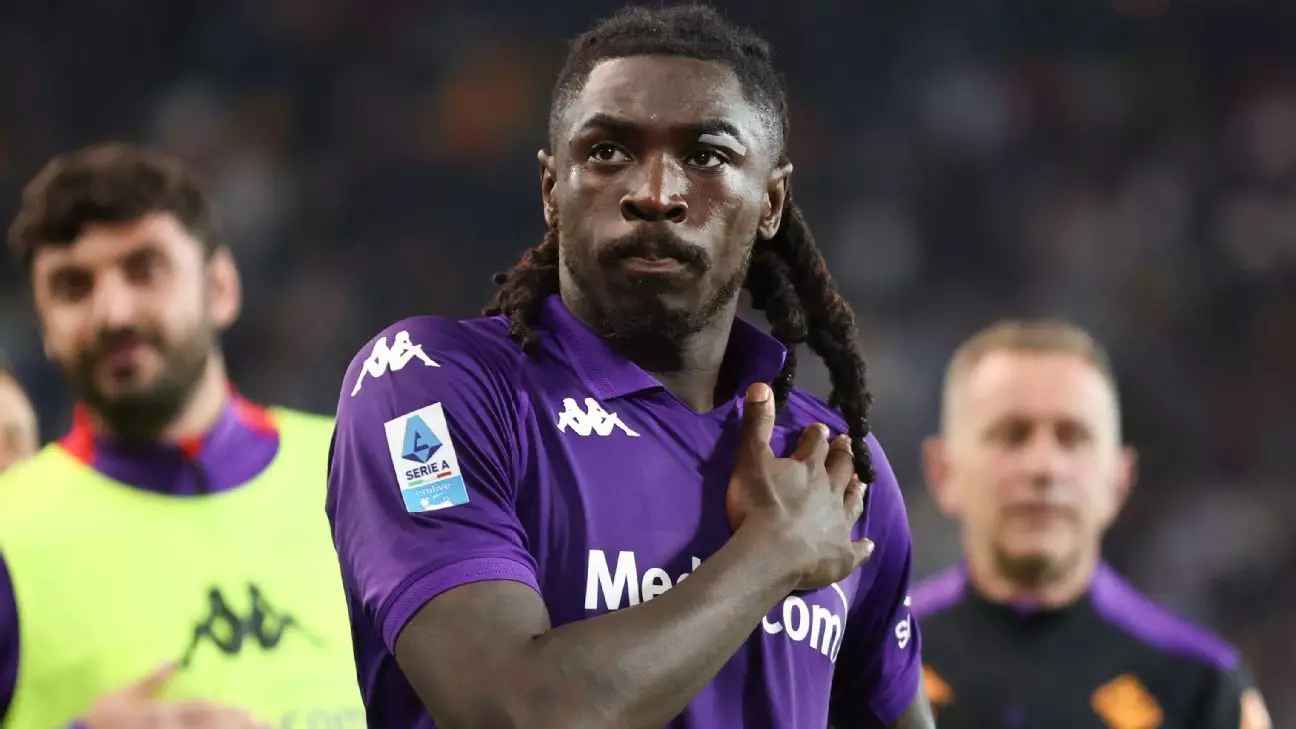Manchester United find themselves at a critical crossroads in the summer transfer window, pressured to finalize their acquisition strategy amidst growing competition and ticking deadlines. The club’s pursuit of Brentford’s Bryan Mbeumo has hit a significant snag after a sizable bid of £62.5 million was declined, underscoring the premium placed on the forward by Brentford and suggesting that United may need to reconsider their approach.
Simultaneously, Moise Kean has emerged as a plausible alternative but comes with its own complications. Fiorentina’s reported £44 million release clause for Kean, coupled with the looming July 15 deadline, tightens the window for United to act decisively. Kean’s background—once touted as a promising talent during spells at Juventus, Everton, and PSG—adds complexity; he is currently a secondary target but may quickly rise in priority if Mbeumo proves unattainable. This situation highlights United’s delicate balancing act between ambition and pragmatism, a challenge that has characterized much of their recent transfer dealings.
Liverpool’s Tactical Swap Proposal: Navigating Valuations and Youth Prospects
Over at Anfield, Liverpool confront their own transfer puzzle involving Crystal Palace’s Marc Guéhi and promising winger Ben Doak. Liverpool values Guéhi—a dependable English international defender—at close to £50 million, a figure that Palace finds difficult to match. To bridge this financial gap, Liverpool appears willing to include the young Doak as part of a makeweight deal, a move that reveals both clubs’ recognition of the constraints within present-day football economics.
Doak’s profile as a young, flexible talent who enjoyed a loan spell at Middlesbrough not only provides tactical value but also signals Liverpool’s broader strategy of nurturing youth to facilitate bigger acquisitions. Conversely, the reported exit of Jarell Quansah to Bayer Leverkusen further illustrates Liverpool’s ongoing squad remodeling, prioritizing a possible blend of immediate and long-term planning.
European Moves and Departures: The Continental Chessboard
Beyond England’s borders, transfers continue to weave a complex narrative across Europe. Besiktas’ anticipated signing of Tammy Abraham from AS Roma exemplifies shrewd market maneuvering: the Turkish side capitalizes on Abraham’s relative underperformance last season, securing him for €20 million, a bargain for a player still in his prime at 27. This reinforces how players with fluctuating fortunes in top leagues can find renewed opportunities in emerging markets, impacting the overall trajectory of their careers.
Similarly, Arsenal’s Thomas Partey faces an imminent exit, unable to renew his contract and thus entering the free-agent market. Partey’s slow departure is emblematic of Arsenal’s challenging retention policy and highlights the often complicated negotiations with established internationals. Meanwhile, the Gunners’ interest in Brentford’s Christian Nørgaard signals a clear plan to recalibrate their midfield with targeted investments.
Rising Talents and Ambitious Pursuits
German football prodigy Rocco Reitz garners attention from several Premier League clubs, including West Ham United, Brighton, and Fulham. Despite recently extending his contract with Borussia Monchengladbach until 2028, Reitz’s €20 million release clause positions him as an enticing candidate for clubs eager to invest in the future. This underscores a larger ongoing trend: Premier League teams increasingly eye young continental talents to blend potential with value, rather than resorting solely to marquee signings.
Finally, Neom SC’s successful deal for goalkeeper Marcin Bulka, outmaneuvering Sunderland’s late pursuit, signifies how transfer activities now transcend traditional markets as clubs from the Middle East and other regions grow in financial and sporting ambition.
The Bigger Picture: Shifting Dynamics in a Feverish Transfer Market
When viewed collectively, these movements portray a footballing landscape defined by urgency, strategic risk, and an evolving valuation framework. Premier League clubs, caught between financial prudence and competitive necessity, must navigate release clauses, counteroffers, and the intricate balance of squad composition with surgical precision.
Manchester United’s fluctuating targets exemplify the volatile nature of modern transfers, where a single rejected bid can recalibrate entire transfer plans. Liverpool’s willingness to leverage youth assets for established quality shows a nuanced understanding of asset management. Meanwhile, players like Abraham, Partey, and Reitz highlight the individual narratives woven into the broader market dynamics, demonstrating that transfers are as much about personal career arcs as club ambitions.
This window is a fascinating test of executive acumen, where the difference between success and failure may hinge on timing, negotiation skill, and boldness—qualities that some clubs have shown in abundance, while others continue to struggle with decisiveness and clarity.

Leave a Reply